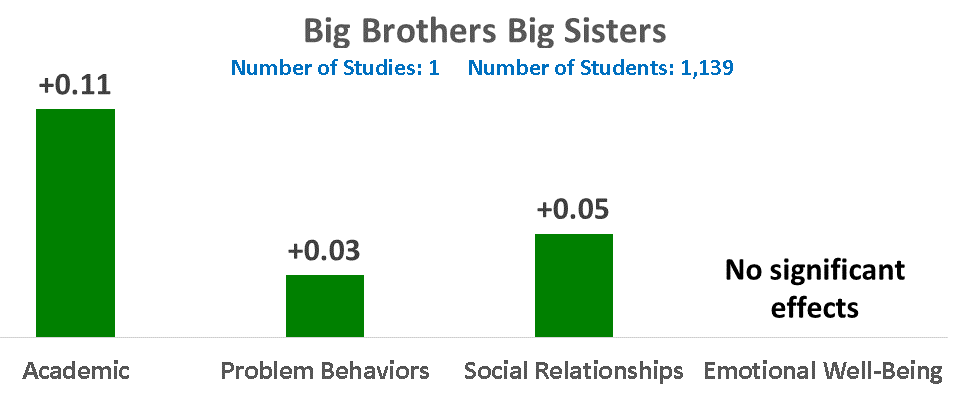
Program Description
An extension of the Big Brothers Big Sisters (BBBS) community-based mentoring (CBM) program, the school-based monitoring (SBM) program pairs volunteer mentors with youth for school-based meetings with the goal of forging special relationships, decreasing drug and alcohol use, increasing self-control and cooperation, improving teacher-student relationships, and improving academic achievement. BBBS agencies partner with schools nationwide to support students. Children are usually referred to the SBM program by teachers or school staff, and mentors often come from high school, college, or businesses. Meetings between mentors and youth typically take place on school grounds (such as the cafeteria or library) and last 45 minutes or longer each week, either during the school day or after school. There is no set structure for these meetings, but schools can determine a set of recommended or requested activities from which mentors and mentees can choose. There is typically a non-academic focus to these meetings, with creative activities, games, and discussions complementing tutoring and homework assistance.
Program Outcomes
Program Outcomes:
Herrera, Kauh, Cooney, Grossman, & McMaken (2007) conducted a large-scale national random assignment impact study to evaluate the school-based mentoring (SBM) program over the course of one year. Participants came from 10 BBBS agencies across the U.S. The study included 37% White, 23% Hispanic, and 18% African American students, and were predominantly economically disadvantaged (69% received free/reduced-price lunch), and from single-parent homes (39%). Recruited mentors were 77% White, 72% female, and 50% 18 years old or younger.
Outcome data were obtained from student and mentor surveys in the study. The study found that youth participants demonstrated significantly improved academic performance (ES=+0.07) and engagement (ES=+0.12), qualifying BBBS for a “Strong” rating in the academic category. BBBS students also significantly decreased disruptive behavior (+0.07) and showed improvements in interpersonal relationship skills (ES=+0.07), qualifying BBBS for the “Strong” category in both problem behaviors and social relationships categories. No significant differences were found in drug or alcohol abuse, pro-social behavior, social skills, school climate, or self-esteem.
Herrera, Grossman, Kauh, & McMaken (2011) later completed a follow-up study with the same group of students and mentors during the following year, though at this point, few of the original students were still participating in the SBM program. In addition to teacher and mentor surveys, data were collected through teacher perception surveys. Academic and social relationship effects were found to diminish over time. However, students still reported having a special adult in their lives.
Staffing Requirements
Volunteer mentors must be recruited by BBBS
Professional Development/Training
Volunteer mentors are required to complete a pre-match training
Technology
None required
